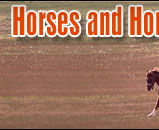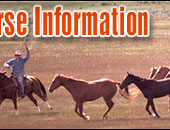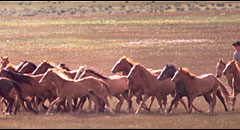 |
   |
|
|
|
You are here: Horses > Horse training > Buying a horse |
|
Basic Horse Buying Tips:
Have a Vet Take a Look at the Horse Before Purchasing
Buying a horse isn't a purchase to be taken lightly, so
most thoughtful buyers hire a veterinarian to give a horse
the medical once-over and report on its condition. In a
pre-purchase vet check, the vet will look at the horse's
conformation, check its wind, digestion (by listening to
stomach sounds), hearing and eyesight, lungs and heart. |
|
|
The vet will also evaluate
the horse's movement and soundness. These are the general
tips and checks; a good vet will also consider what the buyer intends
to do with the horse before recommending whether or not the
horse be purchased. In the case of horses being purchased
for breeding purposes, there will be an analysis of
reproductive fitness, but reproductive capacity isn't
usually covered by a general vet check. |
In an ideal situation, the vet check is attended by the
prospective buyer, so the vet can talk with that person
while discovering things about the horse. The buyer can ask
questions, and the vet can good an idea about how well the
buyer and horse might match. It's perfectly respectable for
a vet to veto a horse because he or she feels it won't be
the right horse for the buyer: especially new horse owners
are not only buying the checkup, but the expertise of the
vet in making an important choice. If you're about to buy a
horse whose temperament or training (or lack of training)
may spell trouble for you, a good vet won't be afraid to
offer an opinion. Although some people believe that the
question of a proper match isn't the vet's business, it's
safer for the horse and the owner if the vet takes a serious
interest in the potential pairing. Sometimes a vet will
recommend not to buy a horse unless a professional trainer
is to be engaged; it's always best to listen.
The seller will usually attend the vet check, but most vets
wish that sellers wouldn't talk about the horse during the
check, as it can influence their perceptions and probably
won't add to the buyer's confidence.
No horse is perfect, and your vet may see something that
only an expert might notice. If there seems to be a physical
problem, the vet may use X-rays to check on a diagnosis.
Even in the case where there is something wrong, it may just
be something that needs to be watched, or treated in a
particular way. A lot depends on what the horse is to be
used for. Your vet may make recommendations about the weight
a horse or pony can bear, about training issues or
temperament. And for someone who isn't an expert, having an
expert vet who's not afraid to tell the truth can make the
difference between buying a horse you'll love and enjoy and
one that you wind up having to sell.
If you ask a vet to check a horse whose problems are already
known to that person, chances are that the vet will either
decline to do the check or will inform you of the problems
before moving on to anything else. A lot of the vet check
has to do with professional ethics; vets often won't report
on horses belonging to regular clients because of the
potential for conflict of interest.
Talking about a vet check is an interesting conundrum
because people who don't want to take someone else's advice
probably won't have a pre-purchase vet check, but nearly
everyone else will. But for people new to the world of
horses, it may be enough to tell them what a vet check
entails and what it can do for them. Most people understand
immediately that paying for a vet check will save thousands
or tens of thousands of dollars if it keeps them from buying
the wrong horse.
 |
Read the next horse training article on
How to catch a Loose Horse. |
|
|
|
|
 |
|
|
|
|
|
Horse Education
|
|
|
|
|
Horse Information Topics
|
|
|
|
|
|
|
|
Horse Business Owners
|
| |
Advertise with Us
Have your horse products or services exposed to over 27,000 of our monthly visitors.
|
|
|
|
|
|